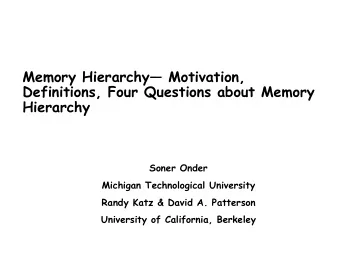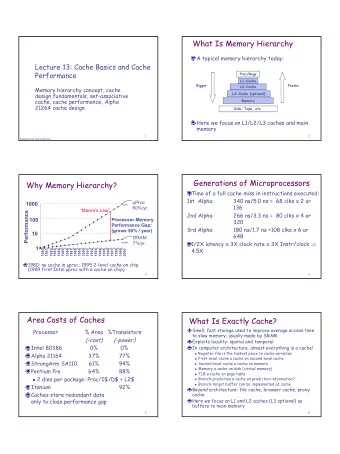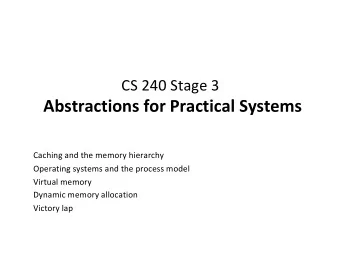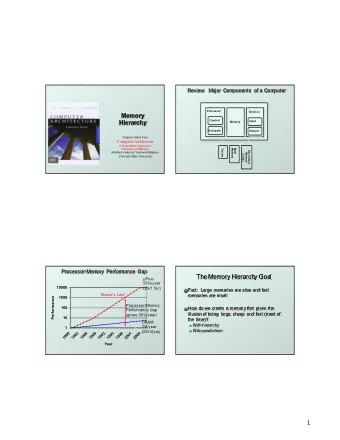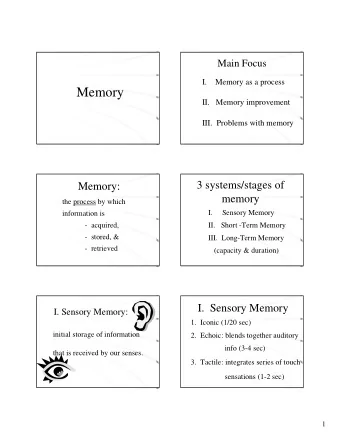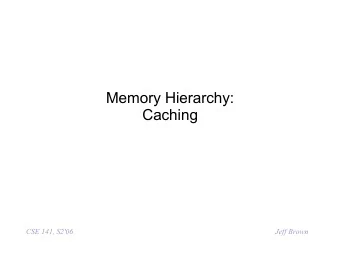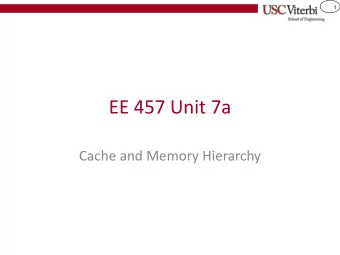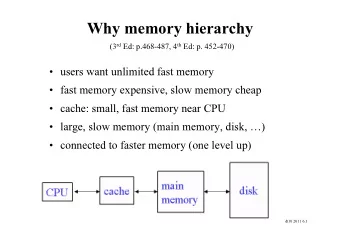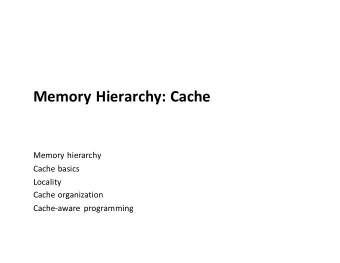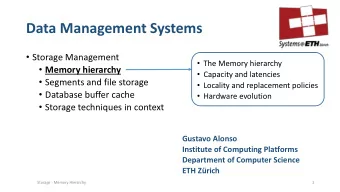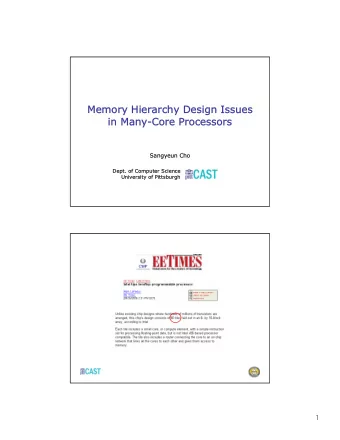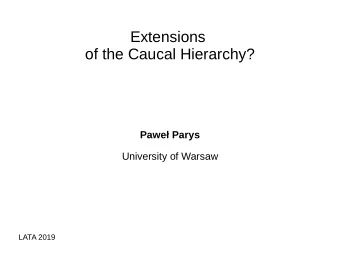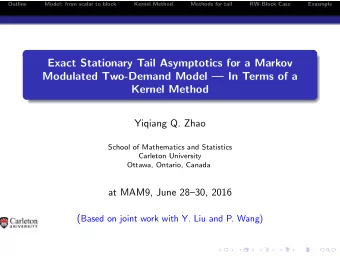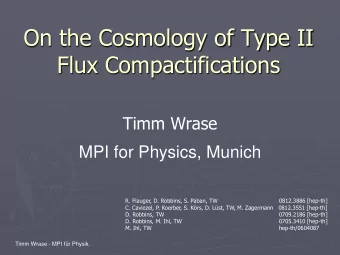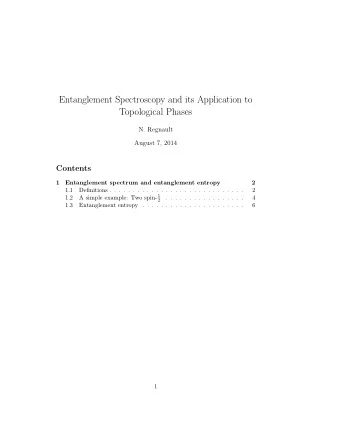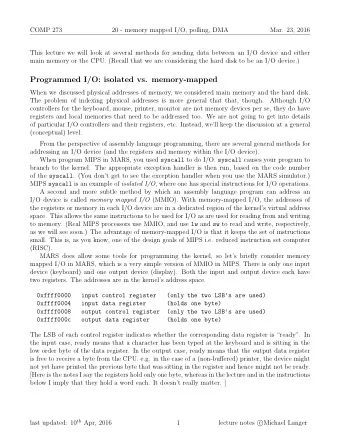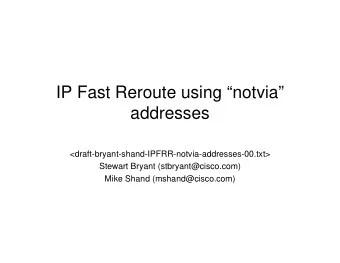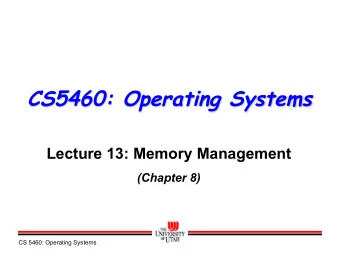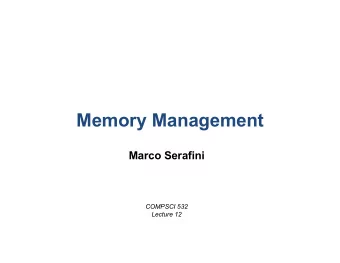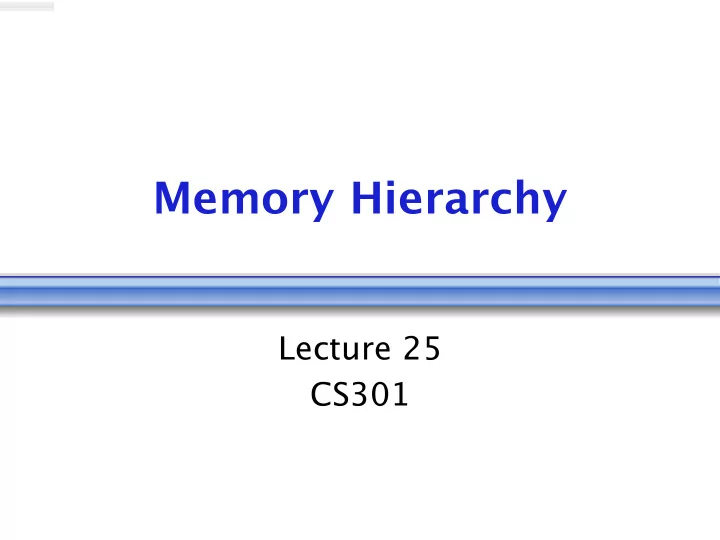
Memory Hierarchy Lecture 25 CS301 Administrative Program #3 due - PowerPoint PPT Presentation
Memory Hierarchy Lecture 25 CS301 Administrative Program #3 due Friday, 12/7 at 4:59pm Daily Review due 11/29 at 8am Lab #8 due Friday 11/30 at 1:29pm HW #9 assigned w Due Wednesday, 12/5 at 4:59pm Virtual Memory DRAM as
Memory Hierarchy Lecture 25 CS301
Administrative • Program #3 due Friday, 12/7 at 4:59pm • Daily Review due 11/29 at 8am • Lab #8 due Friday 11/30 at 1:29pm • HW #9 assigned w Due Wednesday, 12/5 at 4:59pm
Virtual Memory
DRAM as cache • What about programs larger than DRAM? • When we run multiple programs, all must fit in DRAM! • Add another larger, slower level to the memory hierarchy - use part of the hard drive.
Virtual Memory • Memory Size - • Protection -
Virtual Memory • Memory Size - allows total memory allocation to exceed DRAM capacity. • Protection -
Virtual Memory • Memory Size - allows total memory allocation to exceed DRAM capacity. • Protection - programs may not access each other’s memory.
Multi-Processing - no VM • Program A begins Prog A
Multi-Processing - no VM • Program A begins Prog A • Program B begins What happens if A wants more memory? Prog B
Multi-Processing - no VM • Program A begins Prog A • Program B begins What happens if A wants more memory? Out of luck. If we gave A memory after the Prog B end of B, then A would be able to access all of B’s memory.
Multi-Processing - no VM • Program A begins • Program B begins • Program A ends Prog B
Multi-Processing - no VM • Program A begins • Program B begins Prog C • Program A ends • Program C ready Prog B
Multi-Processing - no VM • Program A begins • Program B begins Prog C • Program A ends • Program C ready Prog B w It can not run even though there is enough free space w Fragmentation
Virtual Memory • Use hard drive for memory that does not fit in DRAM • Allocate memory in pages • Provide protection by page
Address Space • Virtual Address Space • Physical Address Space
Address Space • Virtual Address Space w Located on Hard Drive (essentially) w Starts at 0 for each program • Physical Address Space
Address Space • Virtual Address Space w Located on Hard Drive (essentially) w Starts at 0 for each program • Physical Address Space w Located in DRAM w The “cache” for the Disk Drive
Multi-Processing - VM Virtual Address Physical Address 0 • Program A begins Prog A • Program B begins 16K Hard Drive
Multi-Processing - VM Virtual Address Physical Address 0 • Program A begins Prog A • Program B begins 16K 0 Prog B 24K Hard Drive
Multi-Processing - VM Virtual Address Physical Address 0 • Program A begins Prog A • Program B begins 16K What happens if A wants more 0 memory? Prog B 24K Hard Drive
Multi-Processing - VM Virtual Address Physical Address 0 • Program A begins • Program B begins Prog A 20K What happens if A wants more 0 memory?Allocate another virtual page. Prog B 24K Hard Drive
Multi-Processing - VM Virtual Address Physical Address • Program A begins • Program B begins • Program A ends 0 Prog B 24K Hard Drive
Multi-Processing - VM Virtual Address 0 Physical Address • Program A begins Prog C • Program B begins • Program A ends 28K 0 • Program C begins w Not all placed in Prog B DRAM w DRAM use need not be contiguous 24K Hard Drive
Virtual Memory is like caching… • _______ is the cache for the __________ w It contains only a subset of the total space • Given an address, determine whether it is currently in the “cache” • On a miss, obtain data and place in “cache”
Virtual Memory is like caching… • DRAM is the cache for the hard drive w It contains only a subset of the total space • Given an address, determine whether it is currently in the “cache” • On a miss, obtain data and place in “cache”
Virtual Memory is not like caching… • The miss penalty is orders of magnitude larger than for the cache • You must know where it resides in DRAM before you can look it up in L1 cache • This leads to a much different implementation
The Search • Cache – search each block in set for the proper tag • Virtual Memory – store a table that is a mapping from virtual address to physical location (DRAM location).
Virtual Memory Implementation • Programs use virtual addresses • VM Block is called a __________ • A VM DRAM “cache miss” is called a ______________. • To access data, the address must translate it to a _______________. • This translation is called _______________ or ________________.
Virtual Memory Implementation • Programs use virtual addresses • VM Block is called a page • A VM DRAM “cache miss” is called a ______________. • To access data, the address must translate it to a _______________. • This translation is called _______________ or ________________.
Virtual Memory Implementation • Programs use virtual addresses • VM Block is called a page • A VM DRAM “cache miss” is called a page fault. • To access data, the address must translate it to a _______________. • This translation is called _______________ or ________________.
Virtual Memory Implementation • Programs use virtual addresses • VM Block is called a page • A VM DRAM “cache miss” is called a page fault. • To access data, the address must translate it to a _physical address_. • This translation is called _______________ or ________________.
Virtual Memory Implementation • Programs use virtual addresses • VM Block is called a page • A VM DRAM “cache miss” is called a page fault. • To access data, the address must translate it to a _physical address_. • This translation is called memory mapping_ or _virtual to physical translation.
Virtual Memory Implementation • Translation process: Virtual page number Page offset Translation Physical page number Page offset • Why is Physical address smaller than Virtual?
Virtual Memory Implementation • Translation process: Virtual page number Page offset Translation Physical page number Page offset • Why is Physical address smaller than Virtual? DRAM is the cache – should be smaller than the total virtual address space
Virtual Memory Implementation Page faults incredibly costly • DRAM is a cache - w Direct-mapped? w Set-associative? w Fully associative? • Low associativity w miss rate, search time • High associativity w miss rate, search time
Virtual Memory Implementation Page faults incredibly costly • DRAM is a cache - w Direct-mapped? w Set-associative? w Fully associative? • Low associativity w high miss rate, low search time • High associativity w low miss rate, high search time
Virtual Memory Implementation Page faults incredibly costly • DRAM is a cache - w Direct-mapped? w Set-associative? w Fully associative? • Low associativity w high miss rate, low search time • High associativity w low miss rate, high search time Access time: ~50 cycles + search, miss penalty: hundreds of cycles
Virtual Memory Implementation Page fault incredibly costly • DRAM is a cache - w Direct-mapped? w Set-associative? w Fully associative !!!! • Low associativity w high miss rate, low search time • High associativity w low miss rate, high search time Access time: ~50 cycles + search, miss penalty: hundreds of cycles
Virtual Memory Implementation Page fault incredibly costly • Fully associative!!!! • Large block size (4KB-16KB) • Sophisticated software to implement replacement policy w updates are hidden under page fault penalty
Address Space • Virtual Address Space w Located on Hard Drive (essentially) w Starts at 0 for each program • Physical Address Space w Located in DRAM w The “cache” for the Disk Drive
Translation • Does the same virtual address (in all processes) always translate to the same physical address (at one moment in time)? • How often does a translation occur?
Translation • Does the same virtual address always translate to the same physical address? w No - each process has same virtual addresses • How often does a translation occur?
Translation • Does the same virtual address always translate to the same physical address? w No - each process has same virtual addresses w Store translations in process page table • How often does a translation occur?
Translation • Does the same virtual address always translate to the same physical address? w No - each process has same Virtual addresses w Store translations in process page table • How often does a translation occur? w At least once per instruction
Translation • Does the same virtual address always translate to the same physical address? w No - each process has same Virtual addresses w Store translations in process page table • How often does a translation occur? w At least once per instruction w Need to perform translation quickly w Cache recent translations!
Translation • Maintaining per process page tables w Process page table maintained by ____ - ___________________________ • Making translations fast w Use a TLB (__________________________) to cache recent translations w Fully associative but ____________________
Recommend
More recommend
Explore More Topics
Stay informed with curated content and fresh updates.


